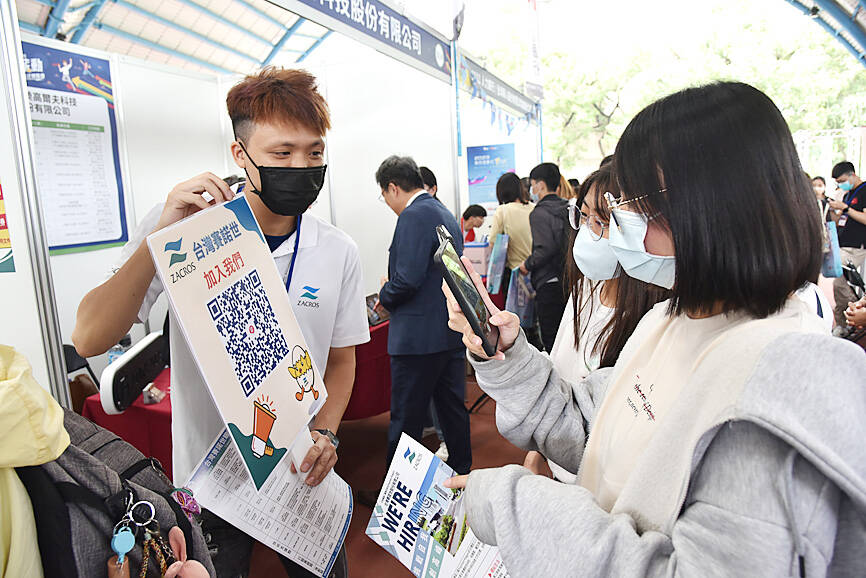Greater inclusion of middle-aged and older workers might be key to solving a serious worker shortage affecting several sectors, as society ages rapidly and many workers have postponed retirement for economic reasons, online human resource agency 104 Job Bank (104 人力銀行) said yesterday.
An unfavorable demographic trend further lends support to the hiring of middle-aged and older workers, 104 Job Bank said, citing inflation and Taiwan’s birthrate, which is the second-lowest in Asia, after Hong Kong.
“Taiwan’s labor shortage is intensifying with demand exceeding supply by 423,000 job openings,” it said, citing internal data.

Photo courtesy of National Pingtung University via CNA
The number of job openings has climbed to more than 1.04 million, and 181,000 of them welcome middle-aged and older candidates, it said.
The openings for senior job applicants soared threefold in the past three years, while interview invitations increased 2.3-fold to 327,000, it said.
Companies have increasingly turned to middle-aged and older candidates to fill vacant positions, it said.
The job bank welcomed the trend, saying that Taiwan’s labor participation rate among people aged 55 or older still lags behind Japan and South Korea.
The new pool of workers might help fill 26,000 openings in the wholesale and retail sectors, 10,000 vacancies at real-estate agencies and 8,000 openings in the hospitality industry as it emerges from the COVID-19 pandemic, 104 Job Bank middle-aged and senior employment division head Shelly Wu (吳麗雪) said.
Middle-aged and older workers are needed for jobs that require little team work, but lots of repetition and flexible hours, Wu said.
Financial considerations have prompted more than 80 percent of seniors to postpone retirement from age 61 to 64 so they can set aside more money, she said, adding that inflation has raised the retirement fund to NT$20 million (US$650,936) from NT$15 million.
The number of senior jobseekers rose to 58,000 last month from 47,000 monthly jobseekers three years ago, the job bank said.
However, the job market remains unfriendly to middle-aged and older jobseekers, as most companies prefer to hire young people, it said.
The time is not on the side of companies, as people aged 40 to 49 are to become the largest age bracket in the labor force, it said.

Hon Hai Precision Industry Co (鴻海精密) yesterday said that its research institute has launched its first advanced artificial intelligence (AI) large language model (LLM) using traditional Chinese, with technology assistance from Nvidia Corp. Hon Hai, also known as Foxconn Technology Group (富士康科技集團), said the LLM, FoxBrain, is expected to improve its data analysis capabilities for smart manufacturing, and electric vehicle and smart city development. An LLM is a type of AI trained on vast amounts of text data and uses deep learning techniques, particularly neural networks, to process and generate language. They are essential for building and improving AI-powered servers. Nvidia provided assistance

DOMESTIC SUPPLY: The probe comes as Donald Trump has called for the repeal of the US$52.7 billion CHIPS and Science Act, which the US Congress passed in 2022 The Office of the US Trade Representative is to hold a hearing tomorrow into older Chinese-made “legacy” semiconductors that could heap more US tariffs on chips from China that power everyday goods from cars to washing machines to telecoms equipment. The probe, which began during former US president Joe Biden’s tenure in December last year, aims to protect US and other semiconductor producers from China’s massive state-driven buildup of domestic chip supply. A 50 percent US tariff on Chinese semiconductors began on Jan. 1. Legacy chips use older manufacturing processes introduced more than a decade ago and are often far simpler than

STILL HOPEFUL: Delayed payment of NT$5.35 billion from an Indian server client sent its earnings plunging last year, but the firm expects a gradual pickup ahead Asustek Computer Inc (華碩), the world’s No. 5 PC vendor, yesterday reported an 87 percent slump in net profit for last year, dragged by a massive overdue payment from an Indian cloud service provider. The Indian customer has delayed payment totaling NT$5.35 billion (US$162.7 million), Asustek chief financial officer Nick Wu (吳長榮) told an online earnings conference. Asustek shipped servers to India between April and June last year. The customer told Asustek that it is launching multiple fundraising projects and expected to repay the debt in the short term, Wu said. The Indian customer accounted for less than 10 percent to Asustek’s

Gasoline and diesel prices this week are to decrease NT$0.5 and NT$1 per liter respectively as international crude prices continued to fall last week, CPC Corp, Taiwan (CPC, 台灣中油) and Formosa Petrochemical Corp (台塑石化) said yesterday. Effective today, gasoline prices at CPC and Formosa stations are to decrease to NT$29.2, NT$30.7 and NT$32.7 per liter for 92, 95 and 98-octane unleaded gasoline respectively, while premium diesel is to cost NT$27.9 per liter at CPC stations and NT$27.7 at Formosa pumps, the companies said in separate statements. Global crude oil prices dropped last week after the eight OPEC+ members said they would